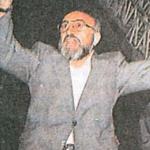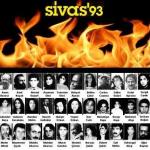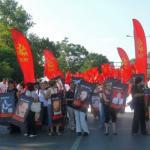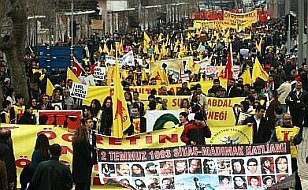On 2 July 1993, the Madimak Hotel in Sivas, central Anatolia, was set fire to when a congress of Alevi intellectuals and artists was meeting there. 37 people died and around 50 were injured.
What is today remembered as the "Sivas Massacre" was committed during the rule of the True Path Party (DYP) and Social Democratic Populist Party (SHP) coalition. Security forces were accused of standing by and letting dozens of people be killed by a mob of tens of thousands. No official was ever held responsible for the murders.
33 people convicted
33 people were tried and convicted of "attempting to destroy constitutional order" and handed death penalties, which were converted into life sentences when Turkey abolished the death penalty.
More still searched for
The court case of another six people started in 2004. Among them is Cafer Erçakmak, accused of trying to push writer Aziz Nesin off the fire engine where he was being sheltered from the mob that had surrounded the hotel and was trying to prevent people from fleeing the fire.
The others are Şefket Erdoğan, Köksal Koçak, İhsan Çakmak, Hakan Karaca, Yılmaz Bağ and Necmi Karaömeroğlu.
Danger of case being dropped
Joint attorneys in the Sivas Massacre case only realised at the last minute that a court case has been continuing without their knowledge since 2004.
Lawyer Şenal Sarıhan told bianet that they were able to join the case at the Ankara 11th Heavy Penal Court at a point where the prosecutor was calling for the case to be dropped because its statute of limitations had run out.
The lawyers should have been informed about the case, but only found out about it accidentally from a journalist.
Application by joint attorneys
When they found out about the case, they managed to apply to join the trial on 19 December 2008. In their application they also stated that the crime of trying to destroy the constitutional order does not have a statute of limitations.
They called for an investigation into the positions and responsibilities of the defendants at the time of the massacre.
The court case will continue on 1 September, and the court has agreed to ask relevant institutions for information and documents on the defendants.
When the file returns from the Supreme Court of Appeals, there will also be an evaluation of whether police officers on duty on the day and victims should be asked to confirm the identities of the defendants.
State making no efforts to find defendants
Şenal Sarıhan has voiced criticism about the difficulties that the state seems to have had in finding suspects involved in the massacre.
Thus, Cafer Erçakmak, a councillor of the Welfare Party (RP) in Sivas at the time, is now said to be living in Germany. Sarıhan believes that the German authorities have been misled about his role in the massacre and are thus not returning him to Turkey.
Similiarly, İhsan Çakmak, was able to marry in the Altınyayla district of Sivas on 27 July 1999, i.e. at a time when he was wanted by the police. He started his military service on 22 May 1997 and was able to register the birth of his child officially.
He also got a driving license from the police in 2000 and became a civil servant in Istanbul in 2005.
Nevertheless, the state has been unable to find him...
Another defendant, Yılmaz Bağ, is also wanted by the police, but was able to marry after the warrant was issued.
Lawyer Sarıhan described this as "serious negligence". (EÖ/AG)
















